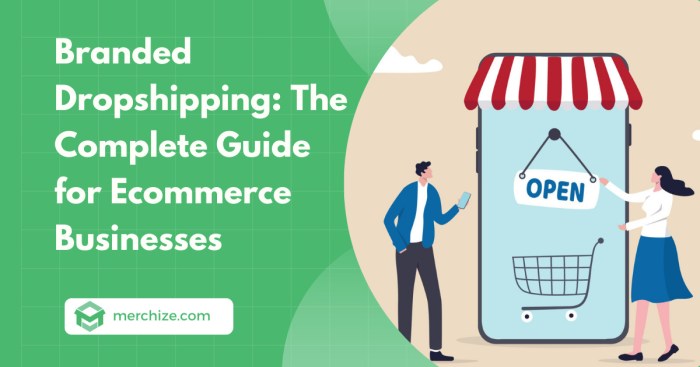Embarking on the journey of creating a dropshipping brand in a competitive market requires meticulous planning and strategic execution. This guide delves into the essential steps to establish a successful brand that stands out amidst fierce competition.
Exploring key aspects like market research, brand identity, product selection, marketing tactics, and strategies for growth, this comprehensive overview equips you with the knowledge needed to thrive in the dynamic world of dropshipping.
Research and Planning

When building a dropshipping brand in a competitive market, thorough research and planning are crucial to stand out from the crowd. By identifying niche markets with lower competition, analyzing competitors' strategies and products, and determining target audience demographics and preferences, you can create a successful brand that resonates with your customers.
Identify Niche Markets with Lower Competition
- Focus on specific product categories or sub-niches within a broader market.
- Use research tools to uncover untapped opportunities.
- Look for emerging trends and customer needs that are not being met by existing competitors.
Analyze Competitors’ Strategies and Products
- Study your competitors' pricing, marketing tactics, and customer reviews.
- Identify gaps in their product offerings and customer service.
- Find ways to differentiate your brand and offer unique value to customers.
Determine Target Audience Demographics and Preferences
- Conduct surveys, interviews, and market research to understand your target audience better.
- Identify their pain points, preferences, and buying behavior.
- Create buyer personas to tailor your marketing messages and product offerings to their needs.
Building a Strong Brand Identity
Creating a strong brand identity is essential for standing out in a competitive market. Here are some key steps to help you establish a unique and compelling brand presence.
Create a Unique Brand Name and Logo
When building a dropshipping brand, it's crucial to start with a memorable and distinctive brand name and logo. Your brand name should be easy to remember, spell, and pronounce, while also reflecting the essence of your business. Similarly, your logo should be visually appealing and represent your brand's values and personality.
Consider working with a professional designer to ensure your brand name and logo are well-crafted and resonate with your target audience.
Develop a Compelling Brand Story
Crafting a compelling brand story is another important aspect of building a strong brand identity. Your brand story should communicate the mission, values, and vision of your business in a way that resonates with customers. Think about what sets your brand apart from competitors and why customers should choose your products.
Use your brand story to create an emotional connection with your audience and build brand loyalty.
Design Visually Appealing Website and Branding Materials
In addition to a unique brand name, logo, and story, designing a visually appealing website and branding materials is key to establishing a strong brand identity. Your website should have a clean and user-friendly design that reflects your brand's aesthetic and values.
Use consistent branding elements such as color schemes, fonts, and imagery across all platforms to create a cohesive brand experience for customers. Invest in high-quality photography and graphic design to make your brand stand out and leave a lasting impression on visitors.
Product Selection and Sourcing
When building a dropshipping brand in a competitive market, it is crucial to carefully select high-quality products that resonate with your brand identity. Finding reliable suppliers with competitive pricing is also essential to ensure a seamless supply chain. Additionally, leveraging dropshipping automation tools can help streamline order processing and enhance efficiency.
Choosing High-Quality Products
It is important to choose products that align with your brand's values and image. Consider factors such as quality, uniqueness, and relevance to your target audience when selecting products to offer in your online store.
Finding Reliable Suppliers
Research and identify suppliers that offer competitive pricing without compromising on the quality of products. Establishing strong relationships with reliable suppliers is key to maintaining a consistent supply of inventory for your dropshipping business.
Utilizing Dropshipping Automation Tools
Consider integrating dropshipping automation tools into your business operations to streamline order processing, inventory management, and shipping logistics. These tools can help reduce manual tasks and improve overall efficiency in running your dropshipping business.
Marketing and Customer Acquisition
Implementing effective marketing strategies is crucial for building a successful dropshipping brand in a competitive market. From social media advertising to influencer partnerships, there are several tactics you can use to attract customers and increase sales. Optimizing your website for is also essential to improve visibility in search engines and drive organic traffic.
Additionally, providing exceptional customer service is key to building brand loyalty and retaining customers for the long term.
Social Media Advertising and Influencer Partnerships
- Utilize social media platforms such as Facebook, Instagram, and Twitter to reach a larger audience and engage with potential customers.
- Collaborate with influencers in your niche to promote your products to their followers and increase brand awareness.
- Create targeted ads that resonate with your target audience and drive traffic to your website.
Optimization
- Optimize your website content with relevant s to improve search engine rankings and attract organic traffic.
- Improve site speed, mobile-friendliness, and user experience to enhance performance.
- Utilize backlinks, meta tags, and alt text to further boost your website's visibility in search results.
Exceptional Customer Service
- Respond promptly to customer inquiries and resolve any issues or complaints in a timely manner.
- Personalize the shopping experience for customers and go above and beyond to exceed their expectations.
- Create a loyalty program or offer incentives to encourage repeat purchases and foster customer loyalty.
Scaling and Growth
As your dropshipping brand begins to establish itself in the market, it's important to focus on scaling and growth strategies to maximize your success.
Analyzing Sales Data
One key aspect of scaling your dropshipping business is analyzing sales data to identify your top-performing products. By understanding which products are driving the most revenue, you can make informed decisions about where to focus your efforts.
- Utilize tools like Google Analytics or your e-commerce platform's analytics to track sales data.
- Identify trends and patterns in your sales data to determine which products are the most popular with your customers.
- Consider factors such as seasonality, marketing efforts, and customer feedback when analyzing sales data.
Expanding Product Offerings
Another strategy for scaling your dropshipping brand is to expand your product offerings to cater to a wider audience. By diversifying your product range, you can attract new customers and increase your revenue streams.
- Conduct market research to identify new product opportunities that align with your brand and target market.
- Source products from reliable suppliers to ensure quality and customer satisfaction.
- Create a cohesive product line that complements your existing offerings and appeals to your target audience.
International Expansion
Consider expanding your dropshipping business internationally to reach new markets and increase your customer base. International expansion can open up new opportunities for growth and revenue.
- Research international markets to understand cultural differences, consumer preferences, and e-commerce regulations.
- Partner with local suppliers or utilize international dropshipping services to streamline the logistics of selling internationally.
- Optimize your website for international customers by offering multiple currencies, languages, and shipping options.
Final Conclusion
As we conclude our exploration of building a dropshipping brand in a competitive landscape, remember that perseverance, innovation, and a customer-centric approach are the pillars of sustainable success. By implementing the insights shared in this guide, you are poised to carve a niche for your brand and thrive in the ever-evolving realm of e-commerce.
Popular Questions
How can I identify niche markets with lower competition?
To identify niche markets with lower competition, conduct thorough market research, analyze trends, and look for gaps that competitors may have overlooked. Additionally, consider targeting specific demographics or emerging industries for untapped opportunities.
What are dropshipping automation tools and how can they benefit my business?
Dropshipping automation tools are software solutions that help streamline order processing, inventory management, and communication with suppliers. They can save time, reduce errors, and improve overall efficiency in your dropshipping operations.
How do I expand my product offerings to cater to a wider audience?
To expand your product offerings, analyze customer preferences, trends in the market, and feedback from existing customers. Consider adding complementary products, variations of existing items, or exploring new categories that align with your brand identity.











